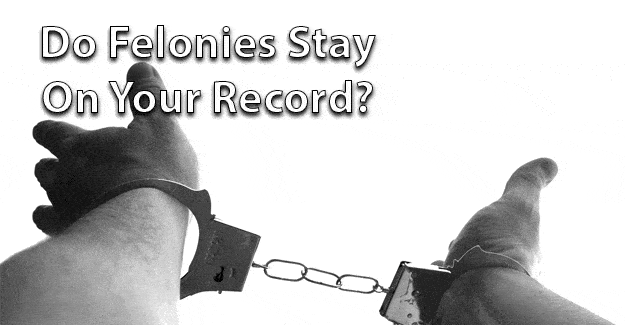Having a felony on your is never a positive thing and the quicker it leaves, the better off you’ll be. But many people wonder if felonies stay on your record and the answer is, well, it depends. In this blog post, we will answer do felonies stay on your record? questions and try to help you better understand what you need to know.
Major Points Covered in this Article:
- Categorizing an Offense
- Criminal History Information
- Consent to View a Criminal History File
- Expunging a Record
- After a Record is Expunged
One of the major concerns a felon has is their prison record when they are released from jail. Typical questions that are asked include; How long does a felony generally stay on my record? Is there anything someone can do to lessen the amount of time? Who can ultimately decide when and if a felony is removed? These are all great questions, and ones that
Categorizing an Offense
If you conduct a search on the subject of “criminal records,” you will quickly discover that the length of time a conviction remains on one’s record can vary from one state to the next. Not only that, the crime classifications between felonies and misdemeanors vary, depending of the location of the offense. The type of crime (property damage, robbery, possession, rape, larceny, murder, etc.) and its severity both are weighed when categorizing an offense.
Information that is Part of a Criminal History
Plus, there are differences between being convicted, charged and arrested, and each of these events can stay on your record for varying lengths of time. Generally, arrests, charges, scheduled court dates, felonies and misdemeanors stay on your criminal history until they are expunged. In order to expunge or remove a history from the public record, you need to petition the jurisdiction or state where you were prosecuted.
Consent Needs to be Given in Order to View a Public Record
Criminal records are deemed to be a part of public record and therefore are maintained at a variety of governmental levels – county, city, state and federal. In addition, law enforcement agencies share criminal record databases with affiliated agencies. Although your criminal record is a part of the public record, not just anyone can see it. Only persons who you have given your consent can view your record. Therefore, if you give a potential employer your consent for them to view your file, they can check your background.
To give you an idea about how long a felony can remain on your record, provided it is not expunged, the records of deceased felons can even be open for public assessment. With that being said, you no doubt will want to expunge your record, especially if you are applying for housing or seeking a job.
Expunging your Record
In order to expunge your felony record, you must petition the criminal justice system in your state to destroy or seal the record of your arrest, conviction and ultimate detention or time that was served. Each state has its own process for expunging records. Generally petty offenses or misdemeanors are usually relatively simple to get expunged.
When it comes to expunging a record, certain factors must be reviewed, including:
- The duration between the incident and request for expungement
- If any current investigations or incidents have, in the interim, occurred
- Number of priors
- If any convictions have been recorded during the waiting period
- The completion of probation without any criminal incidents
- The completion of the terms of a served sentence
- The overall amount of time served
All of the above factors are weighed, when expungement is requested, and can lead to a denial or acceptance for expungement. To make it simple and prove you are worthy of expungement, you must show the court that you have been completely rehabilitated. It is to your best interest then to contact an attorney who can file all the formal documentation and handle the court proceedings.
If you have been acquitted of charges or you win your case in a court of appeals, then the record is usually easily expunged. When a record is expunged or “sealed,” the charges, arrest, court filings, detention and the conviction, which was in force before an appeal was won, can be erased. However, in some instances, a “no contest” or guilty plea can remain on your record for a lifetime. For example, in some states such a Florida, a guilty plea and conviction cannot be expunged from the public record.
If you need help in figuring out how to get a record expunged, you should use our partner LegalMatch as they will match you up with a lawyer for your criminal case for free.
After a Record is Expunged
After a record is expunged, it is not available to the public at the state or local levels. Criminal records continue to remain accessible only at the federal level and can only be accessed by agencies like the FBI. For example, a security clearance, if one is performed, will show any prior arrests, court dates, convictions, and prison time. This information is revealed through the NCIC or the National Crime Information Center, which is operated by the FBI.
